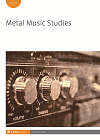
Full text loading...

The 2011 collaborative album Lulu (by Lou Reed and Metallica) presents one with what can be clearly identified as a ‘clash’ between highbrow and lowbrow culture. This ‘clash’, as will be demonstrated in this article, attempts to ‘blur’ what the media tries to enforce by revealing that Metallica and Lou Reed in actuality cannot be exclusively defined by one coherent label. The intended implication is that the album should not be dismissed as its impact, as Metallica’s first postmodern album, ought to be remembered and formally recognized as such – a postmodern experimental metal album.

Article metrics loading...

Full text loading...
References


Data & Media loading...

Publication Date:
https://doi.org/10.1386/mms.5.2.187_1 Published content will be available immediately after check-out or when it is released in case of a pre-order. Please make sure to be logged in to see all available purchase options.